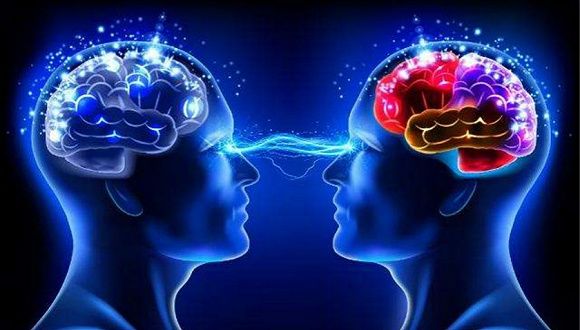The Economist
经济学人
Brains and machines
大脑与机械
Thought Experiments
思想实验
Brain-computer interfaces sound like the stuff of science fiction. Andrew Palmer sorts the reality from the hype.
脑机接口听起来像科幻小说里的东西,安德鲁·帕默从媒体炒作中将事实整理出来。
1. In the gleaming facilities of the Wyss Centre for Bio and Neuro-engineering in Geneva, a lab technician takes a well plate out of an incubator. Each well contains a tiny piece of brain tissue derived from human stem cells and sitting on top of an array of electrodes. A screen displays what the electrode are picking up: the characteristic peak-and-trough wave forms of firing neurons.
位于日内瓦的韦斯生物神经工程中心在阳光下闪闪发光,一个实验室技术人员从恒温箱里拿出一个孔盘。每个孔中都含有一小块由人体干细胞发展而来的脑组织,并被放置在一排电极之上。屏幕上显示着电极接收到的信号:放电神经元的特征峰谷波形。
2. To see these signals emanating from disembodied tissue is weird. The firing of a neuron is the basic building block of intelligence. Aggregated and combined, such "action potentials" retrieve every memory, guide every moment and marshal every thought. As you read this sentence, neurons are firing all over your brain: to make sense of the shapes of the letters on the page; to turn those shapes into phonemes and those phonemes into words; and to confer meaning on those words.
观察这些从脱离身体的组织中发出的信号是一件让人感觉十分奇怪的事。神经元放电是构成智力的基本组件。聚集并结合,这种“行动电压”检索每一个记忆,指引每个瞬间,以及整理每个思绪。正当你读到这句话的时候,你大脑里的神经元正在四处放电:认清本页上的字母形状;将这些形状转化成音素,音素再转化成文字;然后赋予这些文字意思。
3. This symphony of signals is bewilderingly complex. There are as many as 85bn neurons in an adult human brain, and a typical neuron has 10,000 connections to other such cells. The job of mapping these connections is still in its early stages. But as the brain gives up its secrets, remarkable possibilities have opened up: of decoding neural activity and using that code to control external devices.
这组交响曲般的信号复杂到让人困惑。成年人大脑中有多达850亿个神经元,每个正常的神经元细胞之间有10000个连接。映射这些连接的任务仍处于早期阶段。但是大脑在泄漏它的秘密后,揭示了非凡的可能性:解码神经活动并将该代码用于控制外部设备。
4. A channel of communication of this sort requires a brain-computer interface (BCI). Such things are already in use. Since 2004, 13 paralysed people have been implanted with a system called BrainGate, first developed at Brown University (a handful of others have been given a similar devices). An array of small electrodes, called a Utah array, is implanted into the motor cortex, a strip of the brain that governs movement. These electrodes detect the neurons that fire when someone intends to move his hands and arms. These signals are sent through wires that poke out of the person's skull to a decoder, where they are translated into a variety of outputs, from moving a cursor to controlling a limb.
这种通信渠道需要一个脑机接口(BCI)。这样的设备已经在使用了。从2004年起,有13个瘫痪患者被植入了一套名叫‘脑门’的系统,由布朗大学最先研发出来(少数患者植入的是类似的设备)。一群名叫犹他序列的小型电极被植入到运动皮层当中,这是大脑中一条狭长的部分用于控制运动功能。当人打算移动手臂时,这些电极能侦测到放电的神经元。通过贯穿人体头骨的电线,这些信号被传输到一个解码器,在这里信号被转换成不同的输出指令,包括从移动光标到控制躯干。
5. The system has allowed a woman paralysed by a stroke to use a robotic arm to take her first sip of coffee without help from a caregiver. It has also been used by a paralysed person to type at a rate of eight words a minute. It has even reanimated useless human limbs. In a study led by Bob Kirsch of Case Western Reserve University, published in the Lancet this year, BrainGate was deployed artificially to stimulate muscles in the arms of William Kochevar, who was paralysed in a cycling accident. As a result, he was able to feed himself for the first time in eight years.
这个系统使得一位因中风而瘫痪的女性患者使用机械手臂在没有护工帮助的情况下喝到了一小口咖啡。该系统也使得另一个瘫痪患者以每分钟八字的速度打字。这个系统甚至可以重新激活瘫痪的四肢。在以凯斯西楚大学的鲍勃·柯什为首的研究中表明,‘脑门’系统被有效的用于人工刺激威廉·考持瓦的手臂肌肉(该患者由于一场骑行事故而瘫痪);该研究发表于今年的柳叶刀上。结果是,这是他八年来的第一次能够独立进食。
6. Interactions between brains and machines have changed lives in other ways, too. The opening ceremony of the football World Cup in Brazil in 2014 featured a paraplegic man who used a mind-controlled robotic exoskeleton to kick a ball. A recent study by Ujwal Chaudhary of the University of Tubingen and four co-authors relied on a technique called functional near-infrared spectroscopy (fNIRS), which beams infrared light into the brain, to put yes/no questions to four locked-in patients who had been completely immobilised by Lou Gehrigs's disease; the patients' mental responses showed up as identifiable patterns of blood oxygenation.
大脑与机器之间的互动也在其它方面改变了一些人的生命。2014年巴西足球世界杯开幕式,一位下身截瘫患者在由受自己大脑控制的机械义肢的帮助下完成开球。图宾根大学的乌敕沃·乔德瑞和四位联合作者的最新研究表明,他们通过一种叫做功能性近红外光谱的技术(fNIRS, 将红外线照射到大脑内),把“是否问题”直接映入四个植物人的脑部,这些患者曾因患卢·盖瑞克症(译者注:肌肉萎缩性侧索硬化)而完全不能活动;患者的大脑反应表现出明显的血氧样式。
7. Neural activity can be stimulated as well as recorded. Cochlear implants convert sound into electrical signals and send them into the brain. Deep-brain stimulation uses electrical pulses, delivered via implanted electrodes, to help control Parkinson's disease. The technique has also been used to treat other movement disorders and mental-health conditions. NeuroPace, a Silicon Valley firm, monitors brain activity for signs of imminent epileptic seizures and delivers electrical stimulation to stop them.
神经活动可以被刺激,也可以被记录。耳蜗植入器将声音转换成电子信号并将其传送至大脑当中。深部脑电刺激利用植入式电极传递电脉冲,协助控制帕金森症。该技术也被用于治疗其他运动障碍和精神疾病。“神经速度”(音译:牛肉佩斯,或者神经佩斯),一家硅谷公司,监测大脑活动中随时可能出现的癫痫发作的迹象,并发送电流刺激以阻止其发作。
8. It is easy to see how brain-computer interfaces could be applied to other sensory inputs and outputs. Researchers at the University of California, Berkeley, have deconstructed electrical activity in the temporal lobe when someone is listening to conversation; these patterns can be used to predict what word someone has heard. The brain also produces similar signals when someone imagines hearing spoken words, which may open the door to a speech-processing device for people with conditions such as aphasia (the inability to understand or produce speech).
很显然“人脑-计算机接口”也能应用于其他感官信号的输入和输出。加利福尼亚大学伯克利研究所的研究人员解构了当人倾听对话时颞叶中的电流活动;这些电路形状可以用于预测人们听到的词是什么。当人想象自己听到一些词语的时候,大脑也会产生类似的信号,这可能开启一扇通往语言处理系统的大门,服务那些患有失语症的人(缺乏听懂或表达语言的能力)。
9. Researchers at the same university have used changes in blood oxygenation in the brain to reconstruct, fuzzily, film clips that people were watching. Now imagine a device that could work the other way, stimulating the visual cortex of blind people in order to project images into their mind's eye.
在同一大学的研究人员利用大脑中的血氧变化,模糊地重现了实验者曾经观看过的电影片段。现在设想一个能以另一种方式工作的装置,刺激盲人的视觉皮层,以达到在他们的大脑中投射图像的效果。
10. If the possibilities of BCIs are enormous, however, so are the problems. The most advanced science is being conducted in animals. Tinny silicon probes called Neuropixels have been developed by researchers at the Howard Hughes Institute, the Allen Institute and University College London to monitor cellular-level activity in multiple brain regions in mice and rats. Scientists at the University of California, San Diego, have built a BCI that can predict from prior neural activity what song a zebra finch will sing. Researchers at the California Institute of Technology have worked out how cells in the visual cortex of macaque monkeys encoded 50 different aspects of a person's face, from skin colour to eye spacing. That enabled them to predict the appearance of faces that monkeys were shown from the brain signals they detected, with a spooky degree of accuracy. But conducting scientific research on human brains is harder, for regulatory reasons and because they are larger and more complex.
如果BCI的潜力巨大,那么它的问题同样也十分明显。最先进的科学实验是在动物上进行的。“神经像素”(神经皮克斯)是一种细小的硅制探针,由霍华德·休斯研究所的研究人员开发,艾伦研究所和伦敦大学学院监测在小鼠和大鼠的多个脑区上的细胞水平活性。加利福尼亚大学圣地亚哥分校的科学家们已经建立了一个BCI,可以从先前的神经活动中预测,斑马雀要唱什么歌。加州理工大学的研究员已经研究出,猕猴视皮层中的细胞是如何将一个人脸上的50个不同类型的外观进行编码的,从皮肤颜色到眼睛间距。这使科学家们能够通过检测到的猴子脑部信号来推测他们看到的脸部外貌,并且精准度高到不可思议。但是对人类大脑进行科学研究比较困难,因为一些管制的因素,并且人脑更加庞大且复杂。
11. Even when BCI breakthroughs are made on humans in the lab, they are difficult to translate into clinical practice. Wired magazine first reported breathlessly on the new BrainGate system back in 2005. An early attempt to commercialise the technology, by a company called Cyberkinetics, foundered. It took NeuroPace 20 years to develop its technologies and negotiate regulatory approval, and it expects that only 500 people will have its electrodes implanted this year.
即使当BCI人体实验在实验室中实现突破,也很被难转化为临床应用。连线杂志(音译:外耳杂志)在2005年最先报道了令人兴奋的新脑门系统。一家名为赛博动力的公司最早尝试将这项技术商业化,但是失败了。神经佩斯公司用了20年的时间研发技术并且协商以获得监管批准,但预计今年只有500人有望将电极植入体内。
12. Current BCI technologies often require experts to operate them. "It is not much use if you have to have someone with a masters in neural engineering standing next to the patient," says Leigh Hochberg, a neurologist and professor at Brown University, who is one of the key figures behind BrainGate. Whenever wires pass through the skull and scalp, there is an infection risk. Implants also tend to move slightly within the brain, which can harm the cells it is recording from; and the brain's immune response to foreign bodies can create scarring around electrodes, making them less effective.
目前的BCI技术一般需要专家进行操作。利·豪克伯格表示“如果必须要有一个神经工程学硕士站在病人旁边,那这东西就没多大用。”,他是神经学专家并在布朗大学任教授,也是发明“脑门”的关键人物。每当电线穿过头骨和头皮时,都会有感染的风险。植入体也容易在大脑内出现轻微位移,这会损伤它正在检测的细胞;而大脑对外界异物的免疫反应会在电极周围产生瘢痕,导致电极的功效大减。
13. Moreover, existing implants record only a tiny selection of the brain's signals. The Utah arrays used by the BrainGate consortium, for example, might pick up the firing of just a couple of hundred neurons out of that 85bn total. In a paper published in 2011, Ian Stevenson and Konrad Kording of the Northwestern University showed that the number of simultaneously recorded neurons had doubled every seven years since the 1950s. This falls far short of Moore's law, which has seen computing power double every two years.
此外,现有的植入体只能记录大脑信号的一小部分。例如脑门集团使用的犹他序列,可能只能从总共850亿个神经元中挑选出几百个。在2011出版的论文中,西北大学的伊恩·史文森和康莱得·考町表示,自上世纪50年代以来,神经元的并发记录数每七年翻一番。这远远落后于穆尔定律,该定律预测计算机计算能力每两年翻一番。
14. Indeed, the Wyss Centre in Geneva exists because it is so hard to get neuro-technology out of the lab and into clinical practice. John Donoghue, who heads the centre, is another of the pioneers of the BrainGate system. He says it is designed to help promising ideas cross several "valleys of death". One is financial: the combination of lengthy payback periods and deep technology scares off most investors. Another is the need for multidisciplinary expertise to get better interfaces built and management skills to keep complex projects on track. Yet another is the state of neuroscience itself. "At its core, this is based on understanding how the brain works, and we just don't," says Dr Donoghue.
事实上,日内瓦韦斯中心的存在正是因为它很把神经技术从实验室带到临床实践中。囧·多纳秀,该中心的负责人,也是脑门系统的另一个先驱。他说,韦斯中心的目的是帮助有前景的理念跨越一些“死亡之谷”。一个是财务:投资回收期长加上深奥的技术吓退了大多数的投资者。另一个是需要多个学科的专业知识,以获得更好的接口构建和管理技能,以求复杂的项目能够正常运行。然后还有一个是神经科学本身的情况。“神经科学的核心是基于对大脑工作方式的认知,但我们并不拥有这个基础,”多纳秀博士说。
Me, myself and AI
我,我机给,以及人工智能
15. This odd mixture of extraordinary achievement and halting progress now has a new ingredient: Silicon Valley. In October 2016 Bryan Johnson, an entrepreneur who had made a fortune by selling his payments company, Braintree, announced an investment of $100m in Kernel, a firm he has founded to "read and write neural code". Mr Johnson reckons that the rise of artificial intelligence (AI) will demand a concomitant upgrade in human capabilities. "I find it hard to imagine a world by 2050 where we have not intervened to improve ourselves," he says, picturing an ability to acquire new skills at will or to communicate telepathically with others. Last February Kernel snapped up Kendall Research Systems, a spinoff from the Massachusetts Institute of Technology (MIT) that works on neural interfaces.
非凡的成就与停滞的发展,这个奇妙的组合现在有了新的原素:硅谷。2016年10月,布莱恩·强森,一个通过卖掉自己的支付公司“布伦垂”而财富自由的企业家,宣布向“科诺核心”投资1亿美元,这是他创立的用来研发“读写神经编码”的公司。强森先生认为人工智能的兴起也会胁迫人类的能力随之提升。他说,“我发现很难想象在2050年的世界中,我们还没有逼迫自己提升能力,”,他构想了一种通过意志或者心灵感应与他人交流来获取新技能的能力。去年二月科诺核心买下了肯斗研究系,一个在麻省理工学院(MIT)致力于神经接口的工作的子公司。
16. Kernel is not alone in seeing BCIs as a way for humans to co-exist with AI rather than be subjugated to it. In 2016 Elon Musk, the boss of SpaceX and Tesla, founded a new company called Neuralink, which is also working to create new forms of implants. He has gathered together an impressive group of co-founders and set a goal of developing a BCI for clinical use in people with disabilities by 2021. Devices for people without such disabilities are about eight to ten years away, by Mr Musk's reckoning.
并不只有科诺核心认为BCI是人类与AI共存的一种途径,如果不是被AI征服的话。在2016年,太空叉和特斯拉的老板伊隆·马斯克,成立了一家新的公司叫“神经链接”,该公司也在努力创造新形式的植入体。他汇集了一群很厉害的联合创始人,并制定了一个目标,即在2021年之前为残疾人开发一套用于临床的脑机接口。马斯克估计非残疾人士适用的装置在大约八到十年的时间里便可问世。
17. Neuralink is not saying what exactly it is doing, but Mr Musk's thinking is outlined in a lengthy post on Wait But Why, a website. In it, he describes the need for humans to communicate far more quickly with each other, and with computers, if they are not to be left in the dust by AI. The post raises some extraordinary possibilities: being able to access and absorb knowledge instantly from the cloud or to pump images from one person's retina straight into the visual cortex of another; creating entirely new sensory abilities, from infrared eyesight to high-frequency hearing; and ultimately, melding together human and artificial intelligence.
神经链接没有透露他们到底在做什么,但马斯克先生的想法已经罗列在一篇长推文中并发表在网站“等等但是为啥”(Wait But Why) 。在文章中,他阐述了人类更快地与他人和机器沟通的必要性,如果人类不想被AI远远的甩在身后的话。推文提出了一些不可思议的可能性:人类能够及时从云端访问和摄取知识,或将图像从一个人的视网膜直接传输到另一个人的视觉皮层;创造全新的感官能力,包括红外视力和高频听力;以及最终,将人类和人工智能融合一体。
18. In April it was Facebook's turn to boggle minds as it revealed plans to create a "silent speech" interface that would allow people to type at 100 words a minute straight from their brain. A group of more than 60 researchers, some inside Facebook and some outside, are working on the project. A separate start-up, Openwater, is also working on a non-invasive neural-imaging system; its founder, Mary Lou Jepsen, says that her technology will eventually allow minds to be read.
四月份轮到脸书来刺激大家的神经了,他们宣布计划创建一个“无声语言”交互系统,能让人直接利用他们的大脑在一分钟内打出100个字。一个由60多名研究人员组成的小组,分别来自脸书内部或其他地方,正在攻克这个项目。另外一个初创公司“开放沃特”,也在开发无创神经成像系统;它的创始人玛丽·卢·杰普森说这个技术最终能使读心术成为现实。
19. Many BCI experts react to the arrival of the Valley visionaries by rolling their eyes. Neuroscience is a work in progress, they say. An effective BCI requires the involvement of many disciplines: materials science, neuroscience, machine learning, engineering, design and others. There are no shortcuts to clinical trials and regulatory approval.
许多BCI专家对硅谷梦想家的到来翻着白眼。他们表示神经科学是一个半成品。一个有效的BCI技术需要许多学科的参与:材料科学、神经科学、机器学习、工程学、设计以及其他学科。对于临床试验和监管审批而言没有捷径可走。
20. In all this, the sceptics are right. Many of the ambitions being aired look fantastical. Still, this is a critical moment for BCIs. Vast amounts of money are pouring into the field. Researchers are trying multiple approaches. Mr Musk in particular has a track record of combining grandiose aspirations (colonising Mars) and practical success (recovering and relaunching rockets via SpaceX).
在这一切当中,怀疑者是对的。许多上演着的梦想看起来十分荒唐。不过,这是BCI技术的关键时刻。大量资金涌入这个领域。研究人员正在尝试多种方法。尤其是马斯克,他有一条业绩记录:将宏伟的愿望(殖民火星)和实际的成功(通过太空叉公司将火箭回收发射)结合在一起。
21. To be clear, "The Matrix" is not imminent. But BCIs may be about to take a big leap forward. For that to happen, the most important thing is to find a better way of connecting with the brain.
需要明确的是,“黑客帝国”当中的剧情并不会立刻上演。但是BCI技术很有可能要向前迈一大步。要做到这一点,最重要的是要找到一种更好的连接大脑的方式。
免责声明:本文英文原文来源于经济学人官网,翻译部分仅供学习交流,版权归原作者所有,并不代表本人观点,且本人不承担任何法律责任。如果有侵犯到您的权利,请及时联系本人删除 ╮( ̄▽ ̄)╭

